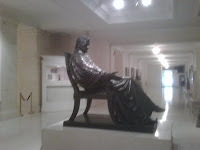The court said Monday it will rule on the constitutionality of a law that makes it a federal crime for people to claim falsely, either in writing or aloud, that they have been awarded the Medal of Honor, a Silver Star, Purple Heart or any other military medal.
The Stolen Valor Act, which passed Congress with overwhelming support in 2006, apparently has been used only a few dozen times, but the underlying issue of false claims of military heroism has struck a chord in an era in which American soldiers are fighting two wars.
At the same time, the justices have issued a series of rulings in recent terms in favor of free expression, striking down California's violent video restrictions and a federal law involving cruelty to animals. It also upheld the right of protesters to picket military funerals with provocative, even offensive, messages.
The federal appeals court in California struck down the military medals law on free speech grounds, and appeals courts in Colorado, Georgia and Missouri are considering similar cases.
The Obama administration is arguing that the law "serves a crucial purpose in safeguarding the military honors system." The administration also says the law is reasonable because it only applies to instances in which the speaker intends to portray himself as a medal recipient. Previous high court rulings also have limited First Amendment protection for false statements, the government said.
This was the case that Judge Kozinski said went too far because everyone lies:
Saints may always tell the truth, but for mortals living means lying. We lie to protect our privacy (“No, I don’t live around here”); to avoid hurt feelings (“Friday is my study night”); to make others feel better (“Gee you’ve gotten skinny”); to avoid recriminations (“I only lost $10 at poker”); to prevent grief (“The doc says you’re getting better”); to maintain domestic tranquility (“She’s just a friend”); to avoid social stigma (“I just haven’t met the right woman”); for
career advancement (“I’m sooo lucky to have a smart boss like you”); to avoid being lonely (“I love opera”); to eliminate a rival (“He has a boyfriend”); to achieve an objective (“But I love you so much”); to defeat an objective (“I’m allergic to latex”); to make an exit (“It’s not you, it’s me”); to delay the inevitable (“The check is in the mail”); to communicate displeasure (“There’s nothing wrong”); to get someone off your back (“I’ll call you about lunch”); to escape a nudnik (“My mother’s on the other line”); to namedrop (“We go way back”); to set up a surprise party (“I need help moving the piano”); to buy time (“I’m on my way”); to keep up appearances (“We’re not talking divorce”); to avoid taking out the trash (“My back hurts”); to duck an obligation (“I’ve got a headache”); to maintain a public image (“I go to church every Sunday”); to make a point (“Ich bin ein Berliner”); to save face (“I had too much to drink”); to humor (“Correct as usual, King Friday”); to avoid embarrassment (“That wasn’t me”); to curry favor (“I’ve read all your books”); to get a clerkship (“You’re the greatest living jurist”); to save a dollar (“I gave at the office”); or to maintain innocence (“There are eight tiny reindeer on the rooftop”).
And we don’t just talk the talk, we walk the walk, as reflected by the popularity of plastic surgery, elevator shoes, wood veneer paneling, cubic zirconia, toupees, artificial turf and cross-dressing. Last year, Americans spent $40 billion on cosmetics—an industry devoted almost entirely to helping people deceive each other about their appearance. It doesn’t matter whether we think that such lies are despicable or cause more harm than good. An important aspect of personal autonomy
is the right to shape one’s public and private persona by choosing when to tell the truth about oneself, when to conceal and when to deceive. Of course, lies are often disbelieved or discovered, and that too is part of the pull and tug of social
intercourse. But it’s critical to leave such interactions in private hands, so that we can make choices about who we are. How can you develop a reputation as a straight shooter if lying is not an option?
While the U.S. Supreme Court is hearing that case, the Florida Supreme Court is going to decide whether loud music is a crime or not:
The Florida Supreme Court will soon rule on whether regulating car stereo volume is a violation of drivers' First Amendment rights, possibly eliminating local noise ordinances in one fell swoop.
The court announced Monday that it will hear arguments in State vs. Catalano in February, a case that began when police in St. Petersburg ticketed a corporate lawyer for exceeding the noise limit by blasting a little Justin Timberlake at 7:34 a.m. on his way to work.
Richard T. Catalano fought the $73.50 ticket, and he's fought it all the way to highest levels of state law.
Really Mr. Catalano? Blasting Justice Timberlake?!
In other news, Cain is polling ahead of Obama...







